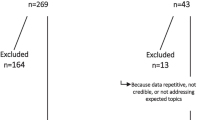Abstract
Scholars have shown how the moral limitations and caveats that many religions pose against new assisted reproductive technologies have hindered women’s medical help-seeking. In the context of reproductive medicine, Catholics, compared to other religious groups (Evans and Hudson 2007), are more likely to disapprove in vitro fertilization (IVF). This article explores, through a qualitative empirical study, the absence of dialogue between Catholic congregants and their priests about IVF. On the one hand, parishioners primarily spoke about infertility issues in a very general manner, but would barely enter into any details. On the other hand, members of the clergy wouldn’t mention IVF’s prohibition unless they were specifically questioned on that matter. This article proposes explanations for this silence.
Similar content being viewed by others
References
Avishai, O. (2008). “Doing religion” in a secular world: Women in conservative religions and the question of agency. Gender & Society, 22(4), 409–433.
Bangsboll, S., Pinborg, A., Yding, Andersen C., & Nyboe, Andersen A. (2004). Patients’ attitudes toward donation of surplus cryopreserved embryos for treatment or research. Human Reproduction, 19, 2415–2419.
Boyle, P. (1989). Solutions to infertility: Even the simplest medical answer raises troubling ethical questions for catholics. Counseling and Values, 33(3), 234.
Chan, C. H., Chan, C. L., Ng, E. H., Ho, P. C., Chan, T. H., Lee, G. L., et al. (2012). Incorporating spirituality in psychosocial group intervention for women undergoing in vitro fertilization: A prospective randomized controlled study. Psychology and Psychotherapy: Theory, Research and Practice, 85(4), 356–373.
Collins, S. C., & Chan, E. (2017). Sociocultural determinants of US women’s ethical views on various fertility treatments. Reproductive Biomedicine Online., 35(6), 669–677.
Cooper-Hilbert, B. (1998). Infertility & involuntary childlessness: Helping couples cope. New York, NY, US: W W Norton & Co.
de Lacey, S. (2007). Decisions for the fate of frozen embryos: Fresh insights into patients’ thinking and their rationales for donating or discarding embryos. Human Reproduction, 22, 1751–1758.
Domar, A. D., Penzias, A., Dusek, J. A., Magna, A., Merarim, D., Nielsen, B., et al. (2005). The stress and distress of infertility: Does religion help women cope? Sexuality, Reproduction and Menopause, 3(2), 45–51.
Downey, J., & McKinney, M. (1992). The psychiatric status of women presenting for infertility evaluation. American Journal of Orthopsychiatry, 62, 196–205.
Dutney, A. (2007). Religion, infertility and assisted reproductive technology. Best Practice & Research Clinical Obstetrics & Gynaecology, 21(1), 169–180.
Evans, J. H., & Hudson, K. (2007). Religion and reproductive genetics: Beyond views of embryonic life? Journal for the Scientific Study of Religion, 46, 565–581.
Ford, N. M. (2008). A Catholic ethical approach to human reproductive technology. Reproductive Biomedicine Online., 17, 39–48.
Greil, A. L., Porter, K. L., Leitko, T. A., & Riscilli, C. (1989). Why me? Theodicies of infertile women and men. Sociology of Health & Illness, 11(3), 213–229.
Greil, A., McQuillan, J., Benjamins, M., Johnson, D. R., Johnson, K. M., & Heinz, C. R. (2010). Specifying the effects of religion on medical helpseeking: The case of infertility. Social Science and Medicine, 71, 734–742.
Greil, A. L., Slauson-Blevins, K. S., Shreffler, K. M., Johnson, K. M., Lowry, M. H., Burch, A. R., et al. (2016). Decline in ethical concerns about reproductive technologies among a representative sample of US women. Public Understanding of Science, 26, 789.
Guest, G., Bunce, A., & Johnson, L. (2006). How many interviews are enough? An experiment with data saturation and variability. Field Methods, 18(1), 59–82.
Haas, M. J. (2007). Preaching points on in vitro fertilization, ethics and medics. Philadelphia: The National Catholic Bioethics Center.
Harris, C. E. (1956)The ethics of natural law. In: Applying moral theories. Wadsworth: Belmont
Klitzman, R. (2016). Deciding how many embryos to transfer: Ongoing challenges and dilemmas. Reproductive Biomedicine Online, 3, 1–15.
Klitzman, R. (2018). How infertility patients and providers view and confront religious and spiritual issues. Journal of Religion and Health, 57(1), 223–239.
Lyerly, A. D., Steinhauser, K., Namey, E., Tulsky, J. A., Cook-Deegan, R., Sugarman, J., et al. (2006). Factors that affect infertility patients’ decisions about disposition of frozen embryos. Fertility and Sterility, 85, 1623–1630.
Lyerly, A. D., Steinhauser, K., Voils, C., Namey, E., Alexander, C., Bankowski, B., et al. (2010). Fertility patients’ views about frozen embryo disposition: Results of a multi-institutional U.S. survey. Fertility and Sterility, 93, 499–509.
Nachtigall, R. D., MacDougall, K., Harrington, J., Duff, J., Lee, M., & Becker, G. (2009). How couples who have undergone in vitro fertilization decide what to do with surplus frozen embryos. Fertility and Sterility, 92, 2094–2096.
Nachtigall, R. D., MacDougall, K., Lee, M., & Harrington, J. (2010). What do patients want? Expectations and perceptions of IVF clinic information and support regarding frozen embryo disposition. Fertility and Sterility, 94(6), 2069–2072.
Roudsari, R. L., Allan, H. T., & Smith, P. A. (2007). Looking at infertility through the lens of religion and spirituality: A review of the literature. Human Fertility (Cambridge, England), 10(3), 141–149.
Sallam, H. N., & Sallam, N. H. (2016). Religious aspects of assisted reproduction. Facts, views & vision in ObGyn, 8(1), 33–48.
Schenker, J. G. (2000). Women’s reproductive health: monotheistic religious perspectives. International Journal of Gynecology & Obstetrics, 70(11), 77–86.
The National Catholic Bioethics Center. (2007). Preaching points on IVF. Philadelphia: Ethics & Medics.
Author information
Authors and Affiliations
Corresponding author
Ethics declarations
Conflict of interest
No conflict of interests to declare.
Ethical Approval
All procedures performed in studies involving human participants were in accordance with the ethical standards of the institutional and/or national research committee and with the 1964 Helsinki Declaration and its later amendments or comparable ethical standards. The protocol has been approved by the Human Research Protection Office, Institutional Review Boards, Columbia University.
Informed Consent
All participants were sent an information sheet and gave verbal consent.
Additional information
Publisher's Note
Springer Nature remains neutral with regard to jurisdictional claims in published maps and institutional affiliations.
Rights and permissions
About this article
Cite this article
Nicolas, P. In Vitro Fertilization: A Pastoral Taboo?. J Relig Health 60, 1694–1712 (2021). https://doi.org/10.1007/s10943-020-01161-x
Accepted:
Published:
Issue Date:
DOI: https://doi.org/10.1007/s10943-020-01161-x




